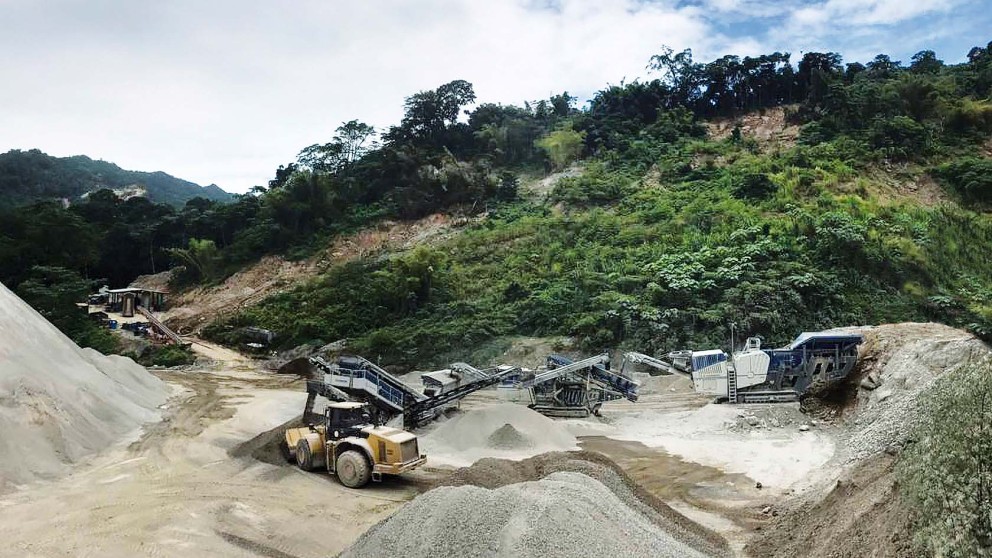
On the island nation of Trinidad & Tobago in the southern Caribbean, a PRO plant train from Kleemann has been operating since October 2020 for Jusamco Ltd.
The core of the plant comprises two PRO plants: The mobile jaw crusher MOBICAT MC 120 Z PRO and the mobile cone crusher MOBICONE MCO 11 PRO. The mobile screening plant MOBISCREEN MS 953 EVO rounds off the process. The plant train impresses with its high productivity and economy and produces final product for the production of asphalt.
Apart from numerous infrastructure projects of its own on the island of Trinidad – the largest island in the nation – Jusamco placed a strong focus on the export of aggregates to Guyana.
In Guyana itself, work is currently under way on a large number of major infrastructure projects related to road and harbor construction, which have massively increased the demand for prepared stone material. Around 75% of the limestone mixture processed by Jusamco is exported from Trinidad to neighboring Guyana.
Efficient and Simple Interlinking
When selecting the plant technology, the decision fell on the PRO plant train from Kleemann. The factors that impressed the most were the high output, the very high quality of the final product and simple line linking of the individual machines to form a plant train.
“The simple linking of the machines and the automatic process of individual plants tuned to one another has made our operation easier,” said Kyle Parsons, responsible project manager at Jusamco. Added to this is the certainty “that, through Kleemann and the Wirtgen Group, we can expect excellent technical support and parts supply. We already have machines from the Wirtgen Group in our fleet and we were always very impressed with the local service,” Parsons said.
Efficiency Thanks to Line Coupling
The plant train consists of three machines whose technical processes are coupled to one another. This means that automatic control stabilizes the complete process. Each machine basically operates independently but forwards signals to the upstream and downstream machines in the event of malfunctions or overfilling. The feed control Continuous Feed System (CFS) also guarantees optimum utilization of the crusher. Ultimately, all components are loaded evenly.
The automated tuning relieves the burden on the operator and harmonizes the process. The connection of all machines also guarantees safety: If an emergency-stop button is pressed anywhere on the plant train, all machines are safely stopped. This concept prevents damage or overload situations. All of this combined results in a high availability and output with low wear. The high output can also be quantified. Compared to the plants that were previously used in the quarry, output has been doubled.
“In our eyes, the automatic control is a real positive factor. Such a plant train would normally require one operator per plant – plus the excavator driver. Thanks to the line coupling, we were able to divide the work between two operators: One who operated the complete plant train and an operator in the excavator. The two operators that are saved can now deal with other things in the quarry, e.g. logistics or material provision,” said Parsons. “More efficiency is hardly possible.”
Intuitive Operation
After delivery of the new plants in September 2020, the project had to face the special challenge posed by the Covid-19 pandemic: The plant train had to be put into operation online without local supervision.
Most countries in South America, as elsewhere, were in lockdown and travel was not possible. How well the plant start-up functioned in spite of these adverse conditions was shown after a year: There were no significant problems and the machines and crushing tools revealed hardly any wear.
On one hand, the low wear resulted because the material was not very abrasive but, above all, due to a very finely tuned process and thus optimum material flow. “Of course we were worried at the start as to whether start-up and instructions on machine operation would work via video conference. Ultimately, we had no choice because the machines were there and we had to produce,” said Parsons. “But thanks to the commitment of all people involved at Kleemann and Resansil, start-up worked really well. Operation with SPECTIVE of course played a big role. Simple and intuitive. That really says it all.”
Wirtgen Group, www.wirtgen-group.com
